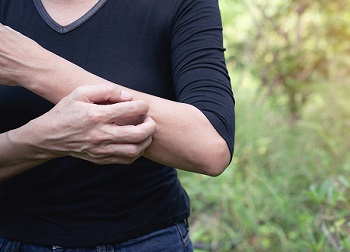Understanding Eczema and Psoriasis

Symptoms
What are eczema and psoriasis?
Eczema (atopic dermatitis) and psoriasis are two different skin diseases that have similar symptoms. Both are inflammatory and create red, itchy and scaly skin.
What are some of the symptoms?
With both diseases, most patients experience severe itching that can be intense and interfere significantly with everyday life. Psoriasis appears in large sections of the skin, sometimes on elbows and knees, and is thick. It can also be accompanied by painful arthritis. Eczema occurs in the areas where the elbows and knees bend, but it can also be on your wrist, face and scalp. It creates dark, scaly, oozing skin that is not as thick as psoriasis.
Who is more likely to develop these skin conditions?
Eczema usually begins in infancy or early childhood, but there is a late-onset form that can affect adults. It is also more common in cities than in rural areas.
Psoriasis can develop in patients from infancy to adulthood; however, most patients develop psoriasis before age 40.
How common are they?
Both of these conditions are common and influenced by a complex interaction of environment and genetics. Some studies report that psoriasis affects about 2 percent of the general population, although in the United States, the number is somewhat higher. Eczema is reported to affect up to 30 percent of the population, depending on your age and where you live.
Is there a time of year when skin conditions are more prevalent?
There are no absolute patterns for what makes eczema worse, as it varies from patient to patient. Many patients with atopic dermatitis experience worse symptoms in the winter when the air is drier. Other patients are also affected by hotter temperatures. Scratching — which can be unavoidable due to the intense itching — will make the rash worse.
Additional factors
Eczema is associated with asthma and food allergies, but treating these conditions does not always cure or remedy the skin condition. Stress also affects eczema.
Psoriasis can get worse from:
- Alcohol or tobacco use
- Certain bacterial infections
- Certain medications
- HIV infection
- Obesity
- Scratching
- Stress
Diagnosis and Treatment
What innovative treatments do you offer for eczema and psoriasis?
Correct diagnosis is the first step. We take a thorough patient history and perform detailed testing to determine the skin condition. Depending on your history and symptoms, we may ask for tests such as a biopsy, patch tests or other diagnostic studies. Once we are sure of the diagnosis, we will make treatment recommendations.
We offer a wide range of extensive topical and systemic therapies, as well as ultraviolet light (UV) therapy—called phototherapy. UV therapy given in a controlled medical setting (not in the tanning salon!) can be extremely effective treatments for both conditions depending on the patient.
How effective are over-the-counter products and what do consumers need to look out for?
Most of the over-the-counter products are low-potency corticosteroids or plain moisturizers. Keeping the skin well moisturized is helpful but not an effective sole treatment for these skin diseases. Be careful with botanicals and “natural products,” as many have fragrances that can aggravate the skin.
What’s the biggest misconception about eczema and psoriasis?
Often, patients think they are doing something wrong that is causing the disease. We want them to understand that these are skin diseases that requires expert evaluation, treatment and follow-up, as well as a lot of hard work on the part of the patient, especially for children and their parents, to treat these conditions.
For more information or to make an appointment, please call 667-214-1171.
A version of this information appeared in Baltimore magazine.
